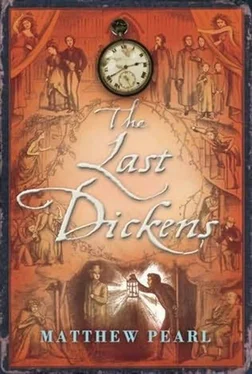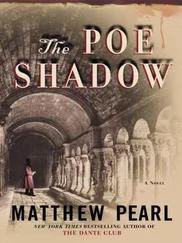Rogers removed a handkerchief and dried his nose and his eyes, both of which were leaking. His head throbbed. He wanted nothing more in the world than to relieve himself of the shooting pains. He wanted nothing more than to buy opium for himself. Not the watered-down, altered, and diluted stuff at the druggists but the pure raw crude poppy juice.
Though it had been a load off his heart to reveal his identity to Os-good and Tom Branagan, he had not told them the entire truth. He did not lie about who he was: Jack Rogers was Jack Rogers. This was precisely the problem. To Rogers, deception came quickly and naturally to protect himself.
It was not true, as Rogers had told Osgood, that he had not used narcotics for six months. In fact, the asylum in Pennsylvania where he had been sent by Harper had prescribed heavy doses of morphine-derived from opium-as a way to “cure” his habits. The morphine, while steering him away from crude opium, caused an entirely new state of dependence he indulged in every morning and night.
Rogers thought about something he had seen during the Civil War, when he had been recruited by a general for a series of secret missions. He had seen a surgeon on the Union side, riding on his horse and pouring liquid morphine into his hand. He would then hold out his hand and the soldiers would line up and lick his glove. This way the surgeon did not have to step down from his horse. It was a disgusting sight to recall. Rogers questioned whether he himself would ever sink so low as the glove-licking soldiers desperate for relief. He despised that proud expression of power he remembered on the face of the surgeon and felt himself its victim.
When people discovered Rogers was an opium habitué, they would sometimes say, I have always wanted to try that. I should like to see what the visions of the opium eater are like.
“You should not,” Rogers would tell them. “You shall not have the dreams of Coleridge and the pleasures of De Quincey and then stop at your convenience. We are not opium eaters; opiates are man-eaters. There is no stopping until the drug is willing to release you.”
Then they would talk of their stronger wills.
Rogers would shake his head ardently. “Do not talk to me of will, man! For will is what I have lost, what has shriveled and died inside of me! There are days when I cannot wind my watch, for my fingers feel as though they will fall off from their joints!”
In going to England, Rogers had sought to fulfill a lucrative mission for Major Harper. He also had known that Edwin Drood was set among the opium trade and had half hoped that seeing it through Dickens's eyes, he might gain some insight into his own dark history. Maybe, in Rogers's attempt to trick Dickens, Dickens had indeed transferred something to him in their sessions at Gadshill that could serve him now-some small sliver of his genius.
In any case, and for however impractical a reason, he could not now walk away from the mystery he'd been originally assigned to investigate. Since he could not remain in England safely, he'd determined that mixing among the opium traders on this side of the Atlantic might offer some clue to the connections he still hoped to make. This afternoon he finally recognized someone he saw out there. This person he recognized, strange to say, he had never seen before in his life.
Among all the scum working the opium trade at the New York harbor, it was an old Turkish sailor with a blue turban and short, shaggy white whiskers. It was the Turk Seated Smoking Opium -the statue Rogers had seen so many times at Gadshill in Dickens's summer study, now come alive! The same statue that had disappeared from Christie's auction house in King Street. Only he was right here in the flesh. There was no denying the perfect verisimilitude of the statue, though the living man had grown older and more beautifully gaunt.
“If that wretched-looking creature is coming all the way from London to New York from that cesspool to this,” Rogers said to himself, “it's likely that he's not ponying up money for the trip himself. And it's too much to just call coincidence. He's someone's messenger, someone who doesn't want to communicate by wire that could be stolen or read by an operator.”
Rogers followed him to a fish shed, which the sailor entered. Rogers stopped at the window and pretended to adjust the plaster over his eye. The Turk passed an envelope into the hands of a slender man with heavy eyelids and a businesslike presence. The exchange was quick and silent and before long the two men had split up.
Rogers, waiting anxiously for a few seconds to pass, tucked his bamboo stick under his arm and followed the second man a few paces behind, even as he marked the direction of the Turk.

Lower Provinces, India, the next day, 1870
THE RAINY SEASON HAD MADE ITSELF KNOWN. SUPERINTENDENT Frank Dickens decided to make a stop at an outpost with the small group he had personally selected from the Opium Detective Police. The English military officers welcomed them, and ordered their khansáman to arrange a light supper while they waited for the rain to quiet down.
“What brings you to these provinces, Superintendent?” asked their host, a young Englishman of strong build and amiable personality.
“An opium dacoity , to begin with,” said Frank. “Worth many thousand rupees.”
The host shook his head. “The blessings of civilization do not come easily for our dark-skinned friends, I should say. Their rude morals allow their own people to steal the source of their future wealth. Ah, here we have a pleasant change of subject. Let us eat to your health!”
The Bengal policemen stared at the bowls of lumpy orange-red liquid that were placed in front of them.
“What is it?” asked one of them.
The host laughed. “It is a type of liquid salad, my friend, a Spanish invention called guspácheo. Among the Spaniards, it is employed as a way of reducing thirst and preparing for a hearty meal in the warm climate. It will keep away fever in the hot, rainy weather.”
After indulging in the strange lunch, Frank and his band continued by horseback until reaching a dry riverbank by a jungle. Consulting his hand-drawn map given to him by the inspector who had interrogated the captured dacoit , Frank stopped and dismounted.
“Remove the shovels.”
Procuring an elephant from a nearby police outpost, Frank inspected the area as his men dug at several different spots, while the rain would come down hard and then at regular intervals give way to the blazing sun. Though the activity was wearying, Frank could not help admiring the image of himself as the conquering European atop the awesome beast. He thought dismissively about his time being trained to work at All the Year Round and the disappointment of his father later. It was not that Frank could not manage the writing, he simply could not manage the boredom of it the way his older brother Charley could.
When he had been a schoolboy, his father had announced to Frank one day that he would teach him shorthand because it was a salable skill, and that the great Boz himself had hung a shingle to do freelance shorthand as a reporter in his younger days. The system, called Gurney's after its inventor, was difficult enough to train in, but Dickens had even “improved” it with his own “arbitrary characters” (various marks, dots, circles, spirals, and lines) to represent words, making it more mysterious still. Frank would study carefully, certain he had made excellent progress, and then his father would test him by giving him dictation.
Читать дальше













